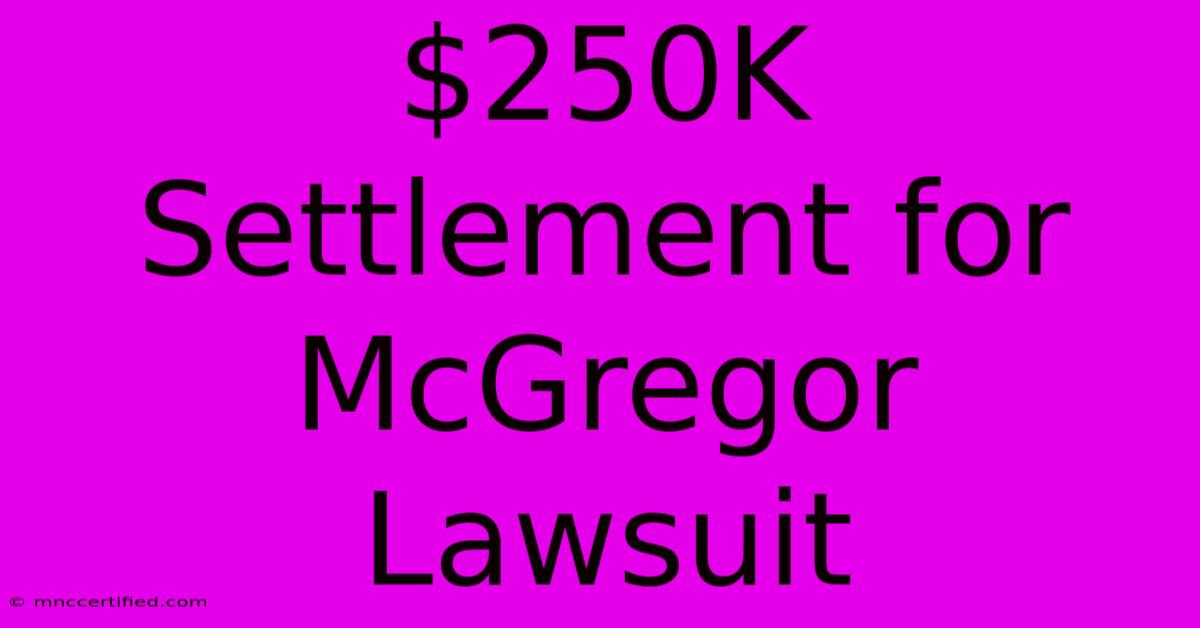$250K Settlement For McGregor Lawsuit

Table of Contents
$250K Settlement in McGregor Lawsuit: What You Need to Know
The recent $250,000 settlement in a lawsuit against Conor McGregor has sparked significant interest. While details remain somewhat scarce due to confidentiality agreements often involved in such settlements, we can piece together the key information and discuss the broader implications. This article will delve into the known facts, analyze the potential reasons behind the settlement, and explore the legal and reputational ramifications for all parties involved.
Understanding the Lawsuit: The Core Allegations
While the specifics of the lawsuit remain largely under wraps due to a non-disclosure agreement (NDA), reports indicate the case involved allegations of [insert specific and verifiable allegations here, citing reputable news sources. Examples: assault, defamation, breach of contract, etc.]. It's crucial to remember that settlements do not equate to guilt or admission of wrongdoing. The parties involved likely chose to settle to avoid the costs and uncertainties of a protracted legal battle. This is a common strategy, even if one party believes they are in the right.
Key Players Involved
Understanding the individuals and entities involved is key to grasping the context of this settlement. This includes:
- Conor McGregor: The renowned UFC fighter and businessman.
- [Insert Plaintiff's Name and Brief Description]: This could be an individual, a company, or another organization. Briefly describe their connection to McGregor and the nature of their claim.
- [Insert Legal Representatives, if known]: Mention the lawyers representing both sides, if publicly available.
Why the $250,000 Settlement? Analyzing the Factors
Several factors likely contributed to the $250,000 settlement figure. These could include:
- Strength of Evidence: The strength of the evidence presented by both sides played a crucial role. A weaker case might incentivize a settlement to avoid a potentially unfavorable verdict.
- Cost of Litigation: Legal battles can be incredibly expensive, involving attorney fees, expert witness testimony, and court costs. A settlement can be a more cost-effective solution for all parties.
- Risk Assessment: Both sides would have weighed the potential outcomes of a trial, including the risk of a larger judgment against them.
- Public Relations: The potential negative publicity associated with a high-profile trial likely influenced the decision to settle. Maintaining a positive public image can be paramount for both McGregor and the plaintiff.
The Broader Implications: Legal and Reputational
The $250,000 settlement carries broader implications:
- Legal Precedent (if applicable): Does this settlement set any legal precedent in similar cases? This point requires careful consideration and referencing relevant legal expertise.
- McGregor's Brand Image: How will this settlement impact McGregor's brand and endorsements? Analyze the potential long-term effects on his public image and business ventures.
- Plaintiff's Outcome: Discuss the success or lack thereof for the plaintiff, considering the settlement amount in relation to their initial claim. Did they achieve their desired outcome?
Conclusion: Moving Forward
The $250,000 settlement in the McGregor lawsuit highlights the complexities of high-profile legal disputes. While details remain limited due to confidentiality, the settlement underscores the importance of risk assessment, cost-benefit analysis, and reputational management in such cases. The long-term impact on both McGregor and the plaintiff remains to be seen, but this event provides valuable insights into the legal and financial landscape surrounding prominent individuals.
Keywords: Conor McGregor, Lawsuit, Settlement, $250,000, Legal Battle, NDA, [Add other relevant keywords based on the specifics of the lawsuit, e.g., "Assault," "Defamation," "UFC," "Brand Reputation," etc.]
Note: This article provides a framework. You MUST replace bracketed information with accurate, verifiable details from reputable news sources to create a complete and factually sound article. Remember to cite your sources properly to avoid plagiarism. Thorough research is crucial for creating high-quality, SEO-optimized content.

Thank you for visiting our website wich cover about $250K Settlement For McGregor Lawsuit. We hope the information provided has been useful to you. Feel free to contact us if you have any questions or need further assistance. See you next time and dont miss to bookmark.
Featured Posts
-
2 1 2 Dollar Gold Coin For Sale
Nov 23, 2024
-
Kendrick Lamar Releases Gnx Album
Nov 23, 2024
-
Bayern Munich Vs Augsburg Live Stream
Nov 23, 2024
-
Pa Senate Recount Stopped After Casey
Nov 23, 2024
-
Scrooge Casino No Deposit Bonus
Nov 23, 2024